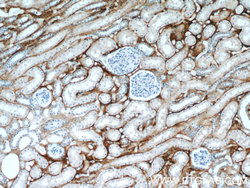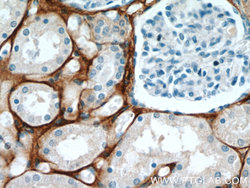60007-1-Ig
antibody from Proteintech Group
Targeting: TGFBI
BIGH3, CDB1, CDGG1, CSD1, CSD2, CSD3, LCD1
Antibody data
- Antibody Data
- Antigen structure
- References [9]
- Comments [0]
- Validations
- Western blot [1]
- Immunohistochemistry [2]
Submit
Validation data
Reference
Comment
Report error
- Product number
- 60007-1-Ig - Provider product page

- Provider
- Proteintech Group
- Proper citation
- Proteintech Cat#60007-1-Ig, RRID:AB_10896828
- Product name
- TGFBI / BIGH3 antibody
- Antibody type
- Monoclonal
- Description
- KD/KO validated TGFBI / BIGH3 antibody (Cat. #60007-1-Ig) is a mouse monoclonal antibody that shows reactivity with human and has been validated for the following applications: IF, IHC, IP, WB, ELISA.
- Reactivity
- Human
- Host
- Mouse
- Conjugate
- Unconjugated
- Isotype
- IgG
- Antibody clone number
- 3E11D11
- Vial size
- 20ul, 150ul
Submitted references Deep spatial proteomics reveals region-specific features of severe COVID-19-related pulmonary injury.
OTUB1 Catalytic-Independently Deubiquitinates TGFBI and Mediates the Angiogenesis in Infantile Hemangioma by Regulating Glycolysis.
Identification of Hub Genes Associated With Sensitivity of 5-Fluorouracil Based Chemotherapy for Colorectal Cancer by Integrated Bioinformatics Analysis.
TGFBI Production by Macrophages Contributes to an Immunosuppressive Microenvironment in Ovarian Cancer.
BIGH3 Promotes Osteolytic Lesions in Renal Cell Carcinoma Bone Metastasis by Inhibiting Osteoblast Differentiation.
Absence of Vitamin K-Dependent γ-Carboxylation in Human Periostin Extracted from Fibrotic Lung or Secreted from a Cell Line Engineered to Optimize γ-Carboxylation.
Transforming growth factor-beta-induced protein secreted by peritoneal cells increases the metastatic potential of ovarian cancer cells.
Modified BIGH3 with an RGDRGD motif promotes human corneal epithelial cell adhesion and migration in vitro.
TGFbeta-induced protein mediates lymphatic endothelial cell adhesion to the extracellular matrix under low oxygen conditions.
Mao Y, Chen Y, Li Y, Ma L, Wang X, Wang Q, He A, Liu X, Dong T, Gao W, Xu Y, Liu L, Ren L, Liu Q, Zhou P, Hu B, Zhou Y, Tian R, Shi ZL
Cell reports 2024 Feb 27;43(2):113689
Cell reports 2024 Feb 27;43(2):113689
OTUB1 Catalytic-Independently Deubiquitinates TGFBI and Mediates the Angiogenesis in Infantile Hemangioma by Regulating Glycolysis.
Li M, Wang X, Yang E, Li Y, Geng Y, Chen Z, Huang S, Zhang D, Wu H
Arteriosclerosis, thrombosis, and vascular biology 2023 May;43(5):654-673
Arteriosclerosis, thrombosis, and vascular biology 2023 May;43(5):654-673
Identification of Hub Genes Associated With Sensitivity of 5-Fluorouracil Based Chemotherapy for Colorectal Cancer by Integrated Bioinformatics Analysis.
Wang Y, Wei Q, Chen Y, Long S, Yao Y, Fu K
Frontiers in oncology 2021;11:604315
Frontiers in oncology 2021;11:604315
TGFBI Production by Macrophages Contributes to an Immunosuppressive Microenvironment in Ovarian Cancer.
Lecker LSM, Berlato C, Maniati E, Delaine-Smith R, Pearce OMT, Heath O, Nichols SJ, Trevisan C, Novak M, McDermott J, Brenton JD, Cutillas PR, Rajeeve V, Hennino A, Drapkin R, Loessner D, Balkwill FR
Cancer research 2021 Nov 15;81(22):5706-5719
Cancer research 2021 Nov 15;81(22):5706-5719
BIGH3 Promotes Osteolytic Lesions in Renal Cell Carcinoma Bone Metastasis by Inhibiting Osteoblast Differentiation.
Pan T, Lin SC, Yu KJ, Yu G, Song JH, Lewis VO, Bird JE, Moon B, Lin PP, Tannir NM, Jonasch E, Wood CG, Gallick GE, Yu-Lee LY, Lin SH, Satcher RL
Neoplasia (New York, N.Y.) 2018 Jan;20(1):32-43
Neoplasia (New York, N.Y.) 2018 Jan;20(1):32-43
Absence of Vitamin K-Dependent γ-Carboxylation in Human Periostin Extracted from Fibrotic Lung or Secreted from a Cell Line Engineered to Optimize γ-Carboxylation.
Annis DS, Ma H, Balas DM, Kumfer KT, Sandbo N, Potts GK, Coon JJ, Mosher DF
PloS one 2015;10(8):e0135374
PloS one 2015;10(8):e0135374
Transforming growth factor-beta-induced protein secreted by peritoneal cells increases the metastatic potential of ovarian cancer cells.
Ween MP, Lokman NA, Hoffmann P, Rodgers RJ, Ricciardelli C, Oehler MK
International journal of cancer 2011 Apr 1;128(7):1570-84
International journal of cancer 2011 Apr 1;128(7):1570-84
Modified BIGH3 with an RGDRGD motif promotes human corneal epithelial cell adhesion and migration in vitro.
Ge H, Cao W, Leng F, Chen W, Liu P, Chen W
Current eye research 2008 Mar;33(3):215-23
Current eye research 2008 Mar;33(3):215-23
TGFbeta-induced protein mediates lymphatic endothelial cell adhesion to the extracellular matrix under low oxygen conditions.
Irigoyen M, Ansó E, Salvo E, Dotor de las Herrerías J, Martínez-Irujo JJ, Rouzaut A
Cellular and molecular life sciences : CMLS 2008 Jul;65(14):2244-55
Cellular and molecular life sciences : CMLS 2008 Jul;65(14):2244-55
No comments: Submit comment
Supportive validation
- Submitted by
- Proteintech Group (provider)
- Main image

- Experimental details
- The TGFBI / BIGH3 antibody from Proteintech is a mouse monoclonal antibody to a recombinant protein of human TGFBI / BIGH3. This antibody recognizes human, mouse antigen. The TGFBI / BIGH3 antibody has been validated for the following applications: ELISA, IHC, WB analysis.
Supportive validation
- Submitted by
- Proteintech Group (provider)
- Main image

- Experimental details
- Immunohistochemical of paraffin-embedded human kidney using 60007-1-Ig(BIGH3 antibody) at dilution of 1:50 (under 10x lens)
- Sample type
- tissue
- Submitted by
- Proteintech Group (provider)
- Main image

- Experimental details
- Immunohistochemical of paraffin-embedded human kidney using 60007-1-Ig(BIGH3 antibody) at dilution of 1:50 (under 40x lens)
- Sample type
- tissue
 Explore
Explore Validate
Validate Learn
Learn Western blot
Western blot ELISA
ELISA